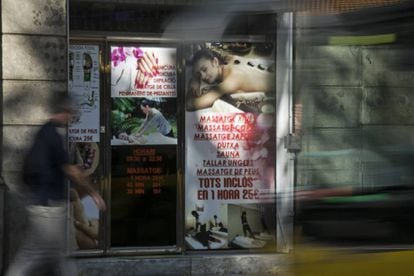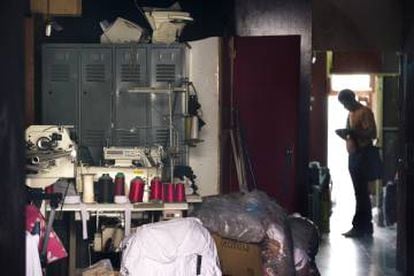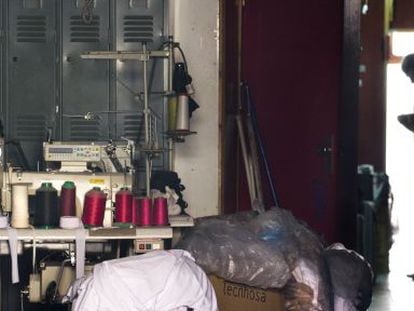From sweatshops to sex shops
Sewing 16 hours a day is a start for many Chinese women in Spain before moving on to massage parlors

Mimi’s room smells of baby oil and is infused with a pink glow. There’s an industrial-sized roll of paper on the shelf that she uses to cover the bed and a couple of towels that do for all the clients – usually around five a day.
The €15 fee for the massage goes direct to the boss; Mimi makes do with the tip for the follow-up service, which comes in at between €10 and €20 depending on what she is asked to do. She’s terrified of catching something, she explains in sketchy Spanish as she hurries along the corridor in a black dress.
Estefania took a month to cross Asia and Europe by car for a job in a sweatshop in Badalona
Mimi works in one of Barcelona’s many Chinese ‘massage’ parlors where, according to the Catalan police, massage is synonymous with sex. Now numbering over 100, they are fast becoming an additional tourist attraction for the city.
Mimi’s parlor is close to the busy Sants neighborhood and doubles as a hair and nail salon whose services are advertised in the window. Mimi’s not happy but she has a contract and set hours. And it has been a long, arduous road to get this far.
Like the other four women interviewed for this report, Mimi arrived in Barcelona three years ago thanks to a “snakehead,” an individual who specializes in smuggling in immigrants from China.
She knew she would be running up garments in a sweatshop, but she wasn’t worried about the hard work – after all, she was used to it. Besides, she would earn more money than she had at home.

What she wasn’t expecting was to find herself practically imprisoned for two years in premises in the Fondo neighborhood of Santa Coloma de Gramenet, where there is a large Chinese community. In fact, this is where many of the 47,973 Chinese immigrants registered in Catalonia begin their new lives in Spain. “The workshop offers many of them access to the job market here,” says a police spokesperson.
Mimi worked 16 hours a day, seven days a week. She ate nothing but rice and noodles and slept alongside 30 others in a makeshift dorm. In return, she earned between €800 and €1,000 a month. She used the money to repay the cost of her trip from China and saved the rest.
It’s a familiar ‘career’ path for many female Chinese immigrants. In 2009, the Catalan police raided 40 illegal garment factories in the Mataró area, arresting 77 people and freeing 450 Chinese immigrants, most of whom were women working in conditions of semi-slavery that included violence.
Known as Operation Wei, the raid exposed how many of the clothes put together by these illegal and exploited workers were destined for high street stores such as Zara, El Corte Inglés, Desigual and Cortefiel. Cheaper than having the clothes made in China or Thailand, the garments were irresistible to the chain stores who claimed they knew nothing about how they were being made.
Mimi went from working at a garment factory to one of Barcelona’s 100 or more massage parlors
But despite the initial success of the operation, it was almost impossible to get anyone to come forward with evidence against the ringleaders of the organization. Nobody admitted to feeling exploited. On the contrary, most were angry at having been left without work and staged a protest to get their jobs back.
“It’s because of the work ethic in China,” says a source who participated in that operation. “The hierarchy is not fixed in these organizations. Whoever is being exploited today could be doing the exploiting tomorrow. The girl doing the massages could end up managing the center if she plays her cards right. They can prosper within the structure, so it’s hard to get them to make a charge against anyone.” In the end, the operation secured no more than three convictions for exploitation.
Estefania – her Spanish pseudonym – is one example of how these Chinese women move through the ranks in this parallel universe. Twelve years ago, she traveled from Beijing across Asia and Europe to Spain. It took a month, with vehicle changes each time they arrived in a new country. She claims to have made the trip with some friends, though the Catalan police maintain that in every country there is a snakehead helping them on their way.
As soon as Estefania arrived in Spain, she was put to work in a sweatshop in Badalona where members of her family were already waiting for her. Like the other women interviewed here, she sewed for 16 hours a day and slept and ate on the premises. She doesn’t recall there being anything odd about it, it was just a lot of work.
Estefanía now has her own massage business with three employees in the Eixample neighborhood of Barcelona. Because of her status, she mans the reception desk but when there are no girls available, she doesn’t hesitate to step in. “In China, when there’s work, you work,” she says.

According to Antonio Rodríguez, Area Chief for the Catalan police’s organized crime unit, Estafania got her papers and paid off her trip and is now able to work for herself, drawing on resources from the community, such as cheap labor and a new loan – the Chinese community avoids asking banks for credit just as they avoid seeking police help in emergencies.
So far, no one has been able to prove that there is a mafia or criminal group behind all this activity, though clearly they are not part of the Spanish system. “Everyone goes from being exploited to doing the exploiting,” says Rodríguez. “Many women have removed themselves from sex work by becoming the ‘mamis’ –the ones who run the establishments. And for them, that’s what it means to do well. It’s a recognized model of success.”
The larger Chinese community does, however, believe that things have changed considerably in the last few years, and dismisses the suggestion that this wheel of exploitation is a general trend.
Lam Chuen Ping, president of the Catalan Union of Chinese Associations, insists that nowadays the picture is very different and that sweatshops are becoming a thing of the past. A businessman who has spent more than 40 years in Barcelona and who acted as spokesman for the workers who lost their jobs in the Wei Operation in 2009, Ping adds that the raid was “absurd” and had “disastrous economic consequences for Mataró.”
Now, given the current state of Spain’s economy,Chinese immigration has fallen off sharply, says Ping, and those that do come have done so to invest. As for the second generation of Chinese in Spain, they are not involved in sweatshops. “We have lawyers, doctors, architects…” he says.
There’s no doubt that second-generation Chinese are fully integrated into the workplace. But according to the Catalan police, sweatshops are still thriving, with staff drawn mainly from the Chinese provinces of Fujia and Zhejiang.
Everyone feeds off the same system, going from being exploited to doing the exploiting
Antonio Rodríguez, Mossos d’Esquadra organized crime unit
“The person in charge of recruitment in China doesn’t have to do much; people know that there is a system that works parallel to the legal one,” says Rodríguez. “It’s like a travel agency. The recruiter has a source of cheap labor, and depending on the area of demand, he organizes the supply; it could be phone centers, bazars, warehouses, workshops or sex work – where there is always an element of deception.”
After the recruitment comes the journey, which could cost between €10,000 and €15,000 depending on how it is made and what forged documents are required.
Though most of Barcelona’s sweatshops were shut down in 2009, it is true that recent demand has triggered a fresh batch of them. And it’s not a world where unions are welcome.
“It’s a very closed and secretive community,” says Carlos Chicano, head of the labor union CCOO’s textile division in Catalonia. “They come here in precarious circumstances and the result is they are exploited. But they themselves don’t feel exploited because they are actually better off here than they were back home.”
But two of the repercussions of these sweatshops for the rest of society are the normalization of unacceptable working conditions and the decimation of any local competition.
Every time there has been a police raid on the garment factories, there is a reshuffle and employees are moved to other industries. Those who have the looks are sent to work in the massage parlors, explains one police officer who has been involved in various busts. “If the girl is cute, they make more money out of her doing that than if she’s making shirts.”
This was certainly the case for Ana, who came to Spain by plane with a fake passport four years ago. She has spent the last two years working in a parlor in Eixample. The premises are neat and, like many others, give onto the street. Her first two years were spent in a garment factory in Badalona. As she had no papers, she used a friend’s passport during that time for ID. “The Spanish,” she says, “can’t tell the difference between us.”
Forging documents is another field of opportunity. In 2011, during Operation Turandot, the Catalan police raided a Chinese passport factory in Santa Coloma de Gramenet in Barcelona. The quality of the passports was so perfect that the FBI took some of them back to the US to study.
“The water marks were of high quality and the microfibers were excellent,” says Rodríguez. “In fact, the documents were all but authentic.”
English version by Heather Galloway.

/cloudfront-eu-central-1.images.arcpublishing.com/prisa/HKZNUTQSVV2TFUJ6TZ4WOEGMB4.jpg)










































